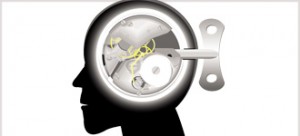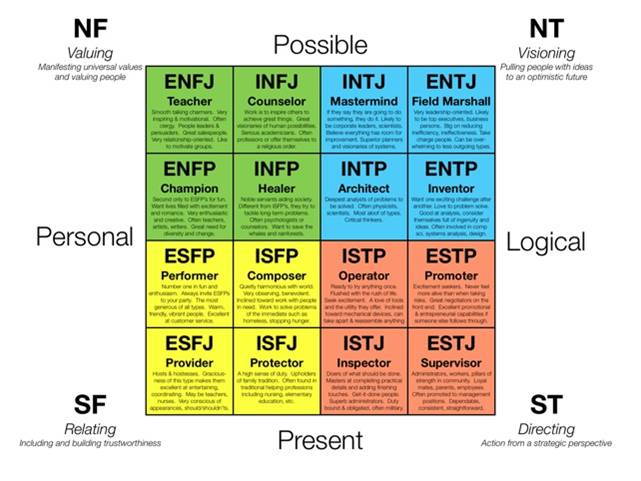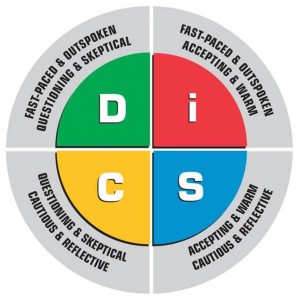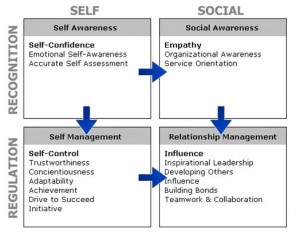This week I have been reviewing job descriptions seeking  candidates with Myers-Briggs Type Indicator (MBTI) experience. And, this week I was asked a question by a colleague wanting to transition from technical training to doing leadership training. He asked which is the preferred of the two psychometrically proven Jungian (Carl Jung) based, behavioral assessment tools, MBTI and DISC.
candidates with Myers-Briggs Type Indicator (MBTI) experience. And, this week I was asked a question by a colleague wanting to transition from technical training to doing leadership training. He asked which is the preferred of the two psychometrically proven Jungian (Carl Jung) based, behavioral assessment tools, MBTI and DISC.
 Personally, I find human behavior fascinating and his question meant he was really giving this some careful consideration, and many others may have a similar question. I have found Wikipedia to be a good reference as an overview. Having used them both, I have studied them in great depth. As a DISC instructor, it has been my experience that most businesses find DISC to be practical on multiple levels. While MBTI measures psychological preferences in how an individual may perceive the world and make decisions the DISC explores the actual behavior of individuals in their environment or within a specific situation. DISC focuses on the person’s styles and preferences of these behaviors.
Personally, I find human behavior fascinating and his question meant he was really giving this some careful consideration, and many others may have a similar question. I have found Wikipedia to be a good reference as an overview. Having used them both, I have studied them in great depth. As a DISC instructor, it has been my experience that most businesses find DISC to be practical on multiple levels. While MBTI measures psychological preferences in how an individual may perceive the world and make decisions the DISC explores the actual behavior of individuals in their environment or within a specific situation. DISC focuses on the person’s styles and preferences of these behaviors.
But, for long term results, I recommend extending beyond these two traditional assessments and consider something that will sustain an organization long term and provide greater ROI. Emotional Intelligence (EI) is hands down the long-term solution I recommend.
MBTI focuses primarily on personality and DISC on behavior. In the workplace, we must focus on behavior. Behaviors are measurable—we can touch them, feel them and see them. Behaviors can be quantified and discussed objectively.
behavior. In the workplace, we must focus on behavior. Behaviors are measurable—we can touch them, feel them and see them. Behaviors can be quantified and discussed objectively.
As a DISC facilitator, I have found DISC to be more practical for business so far as short-term ROI. The DISC assessment takes less time to complete requires less investment and it is easier to deliver and learn. Many fellow organizational development (OD) professionals find that MBTI goes deeper into the personality as a way to predict fit and reactions to situations. I find they are both useful.
Since my colleague’s objective is leadership development, I therefore recommend both. And, to throw another monkey wrench into the works here, I HIGHLY suggest Emotional Intelligence (EI). Here is why.
 Both MBTI and DISC scores can move, but essentially we are who we are—and pretty much always be. So far as development purposes, we are fortunate if we can move the mark single digits at best. But, getting an emotional quotient, (EQ) score is a much more effective predictor of performance and to benchmark a baseline to build upon and grow. This allows us to know where we are and create a growth plan for building that bench strength of leadership. EI is a much more solid tool to use in the workplace when developing people for the long-term as leaders.
Both MBTI and DISC scores can move, but essentially we are who we are—and pretty much always be. So far as development purposes, we are fortunate if we can move the mark single digits at best. But, getting an emotional quotient, (EQ) score is a much more effective predictor of performance and to benchmark a baseline to build upon and grow. This allows us to know where we are and create a growth plan for building that bench strength of leadership. EI is a much more solid tool to use in the workplace when developing people for the long-term as leaders.
As stated in Wikipedia, Daniel Goleman’s model outlines four main EI constructs:
- Self-awareness– the ability to read one’s emotions and recognize their impact while using gut feelings to guide decisions
- Self-management – involves controlling one’s emotions and impulses and adapting to changing circumstances
- Social awareness – the ability to sense, understand, and react to others’ emotions while comprehending social networks
- Relationship management– the ability to inspire, influence and develop others while managing conflict.
By the way, just if you were wondering, I am pretty balanced on my DISC with one point separating each of the 4 quadrants and “I” coming out on top. I am an “ENFJ” on the MBTI. And, my overall EQ score is a 91.
REFERENCES:



